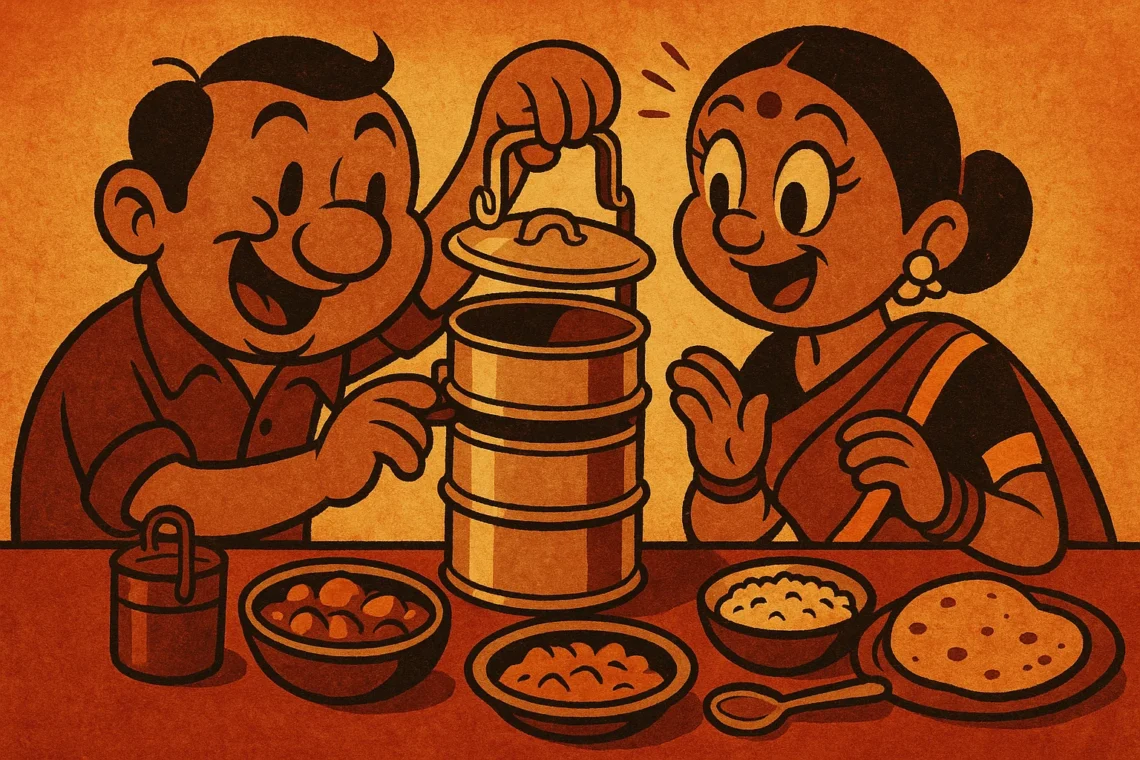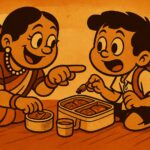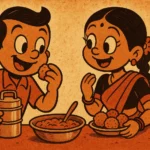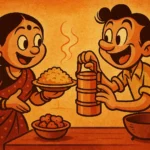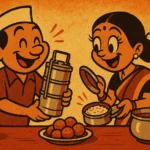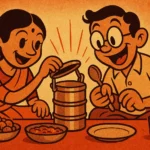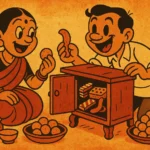Every Indian school kid knows the unspoken hierarchy of lunchboxes. The size of the tiffin, the number of compartments, the type of food — all of it determined your status during the 12:30 lunch break. Some kids came with single-layer boxes filled with jam sandwiches. Others had towering dabbas that could host a full-course wedding meal. But my dabba? It had a secret — a tiny, hidden compartment that my mother used like a whisper. A love letter in stainless steel.
It wasn’t always there. The first few years, my lunchbox was basic: a two-tier tiffin with the usual suspects — sabzi, roti, and a small paper napkin that never quite survived till noon. But sometime around Class 5, my mom bought a new dabba from the local steel store. It looked the same from the outside — circular, tightly latched, wrapped in a cloth bag that once used to be a pillowcase. But when I opened it at school the next day, there it was. A shallow lid under the main container. Hidden. Easily missed. It held exactly three gulab jamuns.
The Surprise Inside
I remember freezing when I saw them. This wasn’t a birthday. This wasn’t a festival. This was just a Tuesday. My best friend Arjun peered over my shoulder and asked, “You brought sweet today?” I nodded, trying to act cool while silently debating whether to share. I did — but only one.
That hidden compartment became legend. Sometimes it had a piece of chocolate wrapped in foil. Sometimes a folded note in my mom’s loopy handwriting: “Good luck for your science test!” Once it had two kaju katlis and a tiny paper heart. She never told me when she’d packed something extra. The magic was in the discovery.
The Psychology of the Middle Compartment
It’s funny, the way we build emotional associations with objects. To anyone else, it was just a design choice. An extra space, probably meant for pickle or salad. But to me, it was a message. A reminder that someone was thinking of me mid-day, mid-chaos, mid-geometry class.
And it worked both ways. On days when I didn’t find anything in there, I didn’t feel disappointed. I felt calm. Because even the absence meant something. It meant routine. It meant everything was okay. No extra note. No kaju katli. Just the basics, perfectly packed. Still enough.
Dabba Diplomacy
By Class 8, my tiffin was semi-famous. Friends would casually linger near me during lunch, hoping for a peek inside. The hidden compartment had become a source of mystery, envy, and sometimes negotiation. I’d trade half a gulab jamun for two bites of someone’s butter paneer. I once swapped a laddoo for a full packet of Uncle Chipps. Even my teachers got curious. One actually asked if I’d ever found a test answer key hidden in there. I hadn’t — but I did once find an extra 20-rupee note wrapped in a napkin. “Buy Frooti,” the note said.
Growing Up, Shrinking Dabbas
College came, and with it, food courts and deadlines. Lunches turned into half-eaten sandwiches, mess food, and instant noodles in cracked mugs. The dabba was retired to the back of a kitchen cabinet, eventually replaced by sleek Tupperware and meal-prepped salads. But sometimes, during particularly rough exam weeks, I’d fish it out, wipe it down, and pack a simple meal — just rice and sabzi — with a small bar of Dairy Milk tucked into the secret compartment. It wasn’t for utility. It was for comfort. For continuity.
Even now, working a tech job in Austin, I’ve kept that dabba. The steel is scratched. One of the latches sticks. But it still closes with that perfect snap — the one that makes you feel like something is sealed just right. Some weekends, I pack it with lemon rice and curd, drive to the park, and eat under a tree like I’m bunking school all over again.
Not Just a Box
It’s easy to say it’s just a lunchbox. But for me, it’s a memory vault. A ritual. A vessel that didn’t just carry food, but care. The hidden compartment was never really about sweets or snacks. It was about being known. Anticipated. Loved quietly.
I don’t know if kids today still get dabbas with hidden compartments. Maybe they get snack packs or pre-portioned bento boxes. But I hope — I really hope — that somewhere, a kid opens their lunch and finds a surprise their parent didn’t tell them about. A reminder that love doesn’t always need an announcement. Sometimes, it just needs a lid that opens with a smile.
Born in Mumbai, now stir-frying feelings in Texas. Writes about food, memory, and the messy magic in between — mostly to stay hungry, sometimes just to stay sane.

